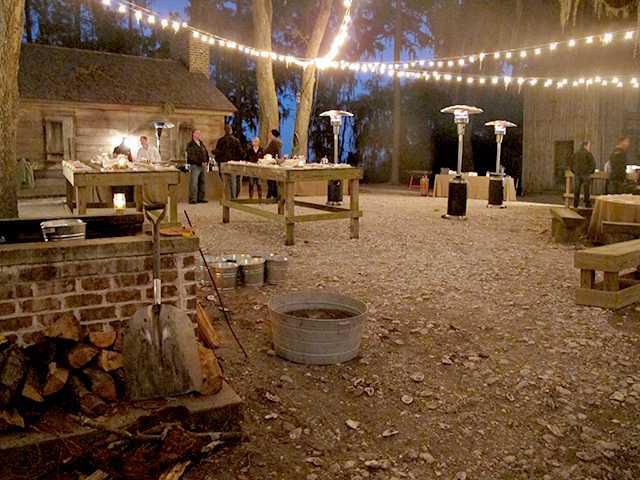Guests at the Richmond Hill Historical Society’s oyster roast Friday night made their way to Ford Plantation’s 1930s oyster house via a sandy path lit by garden torches. Beneath a cold but clear sky, about 150 fundraiser attendees mingled amid live oaks, sampled the fare and awaited the premiere of the society’s new documentary, “The Hidden History of Richmond Hill Georgia.”
“It’s a great atmosphere. It’s beautiful, and it’s cold,” said Maureen Bryant as she stood beneath an outdoor heat lamp.
Richmond Hill Historical Society President Christy Sherman said the event raised about $7,000, which covered the cost of producing the documentary and will enable the organization to move forward with a new educational piece for 2015.
“There are so many fascinating people who played an important role in establishing the history of our area, and the people who live here should be proud of that,” Sherman said during an interview featured on the documentary. “I hope that people will learn to find the hidden history and appreciate its importance and diversity. … And we really do have a treasure here that we can cherish for a long time.”
The historical society also developed a smartphone application called “Coastal Bryan Heritage Trail” that allows users to locate a series of historical markers highlighting 30 sites in Richmond Hill.
The documentary, which is just over 30 minutes long, began with a bit of history on the Guale Indians, French explorers and Spanish missionaries. The film also explored and focused on English military outposts, wealthy planters and rice plantations, Civil War battles, sunken warships and Henry Ford’s positive impact on the area.
Henry Ford had a notable role in establishing Richmond Hill, according to the documentary. He reportedly suggested the name “Richmond Hill” after townspeople wanted to change what then was called “Ways Station” to Fordville or Fordtown in his honor.
A special feature on the DVD also shares several minutes of newly discovered footage from Ford’s era. Sherman said they already had finished filming and editing when they received the additional footage from a group called Critical Past, an organization that examines old rolls of military and government film and photography and then makes it available to the public.
Oyster roast guests Anthony and Tera Fisher said they especially enjoyed the film segments on Ford’s history. The couple moved to Richmond Hill in 2006 from Michigan, where they were members of the Henry Ford Museum in Detroit.
Anthony Fisher, the dean of communication arts at SCAD, said his father worked for the Fords in Detroit.
“We are going to buy the DVD for my father and send it back to him,” Fisher said.
The DVD is available for purchase for $20 at the Richmond Hill History Museum or online at www.richmondhillhistoricalsociety.com.
Tera Fisher said they had already bought a house in Richmond Hill when they realized it was one of Ford’s towns. One of her favorite parts of the Detroit museum is a small-scale replica of Ford’s Richmond Hill home she calls “the dollhouse.” Ford’s wife, Clara Ford, used the replica to plan where to place her furniture before she moved to Georgia.
Jimmy Norris, another attendee, moved to Bryan County in 1995 to be close to the ocean.
“Anything good that will happen will happen because something good in the past — as a reflection of the past,” he said. “It’s been a great evening — a plus for the historical society… and you don’t have to be older than dirt to join the historical society.”
Brad Brookshire, a current board member and past president of the society, said the oyster roast provided a great opportunity to debut some of the work they have done over the past five-plus years.
“The highlight of the event for me was the diversity of the individuals who attended the event. There were familiar faces and not-so-familiar faces, young and old, locals and visitors, all enjoying a wonderful night, good food and each other’s company,” Brookshire said.
Richmond Hill Historical Society Vice President Paige Glazer expressed gratitude to the event’s corporate and individual sponsors.
“The oyster roast was an effort for the society to connect with the community, and I think that happened in such a magical way Friday night, under the stars, on the property where one our most influential past characters lived, worked, created and played,” she said.
Historic document debuts at oyster roast
Richmond Hill history told


Sign up for our e-newsletters